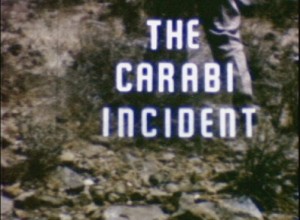
"Once again Harry W. Atwood has used the desert locales of the Southwest and his mastery of outdoor color filming to mount a dramatic and exciting action picture. Although The Carabi Incident is truly an incident rather than a full-fledged photoplay, it does manage to include an abandoned mine, a lost prospector, a worried young girl and her companion — and both a happy and a tragic ending! The production is enriched with Mr. Atwood's usually fine selection of camera angles and suspenseful editing. For these reviewers, however, an excess of dialog subtitles was a drag on the film's development." Movie Makers, Dec. 1952, 341.
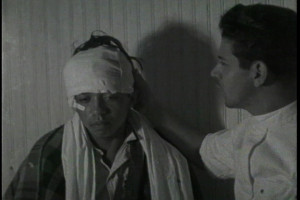
The film chronicles the struggles of young medical interns who had to perform compulsory rural service as part of their medical training.
"Margaret Conneely's film So Long Ago (c. 1950s) intercuts footage of children reading about dinosaurs with special-effects shots of dinosaurs, borrowed from a commercial film (perhaps The Lost World, 1925)" (Tepperman 335).

"A parody of William Shakespeare's "Hamlet," produced and directed by James Blue while he was an undergraduate student at the University of Oregon." Knight Library.
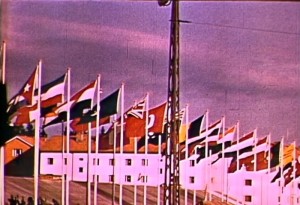
"Olympic summer games Helsinki, Finland, 1952." UC San Diego Library.
"Edited film describes life on the Navajo Reservation. Scenes include women weaving, grinding corn and caring for children (baby is bound into cradle board) and men herding, hoeing corn, silversmithing, and washing and binding their hair. Also shows Navajo Rodeo (encampments, stinger and bronco riding, wild cow milking and horse racing), trading post at entrance to Monument Valley (exchanging rug for goods), Ganado Mission, workers in uranium mine and scenic views of Monument Valley and Canyon de Chelly. Efforts to deal with lack of water is discussed in narration," Human Studies Film Archives, Smithsonian Museum.
A Camper and His Canoe was filmed at Camp Kawagama, the youth summer camp run by the filmmaker and his wife.
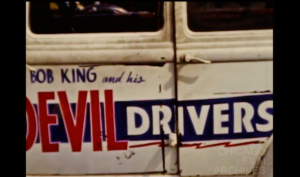
"It stars a young boy, named Bill, who writes to his friend Jim, reflecting on their times together the previous summer. Title cards of the boy’s handwritten letter are interspersed with images of their summer highlights, including scenes of fishing, automobile stunts of “Bob King and his Devil Drivers,” and a motorcycle hill climb competition." Chicago Film Archives
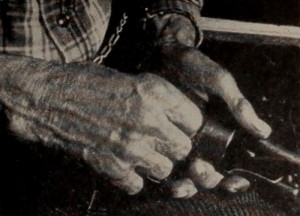
"A western, in color, about a drifter looking for work and then falling in love with his employer’s granddaughter." Church History Library.
"BC Packers (Western Canadian Whaling Ltd.) whaling operations, based at Coal Harbour in Quatsino Sound. The whaling vessel Polar V leaves on a voyage. Preparation of equipment, including harpoons and harpoon gun. A whale is sighted, pursued and harpooned; it struggles, dies, and is flagged. The onboard scenes continue, showing more harpoon preparation, hunting and killing of whales. Whale is towed to Coal Harbour, where the flensing, butchering and processing of the carcass is shown. The Polar V sets out again; in very rough seas, another whale is pursued and killed. " (BC Archives)
The Western Canada Whaling Company was a sub-division of British Columbia Packers Limited.
The filmmaker is not identified. Film begins with the credit "British Columbia Packers presents..."
Total Pages: 299